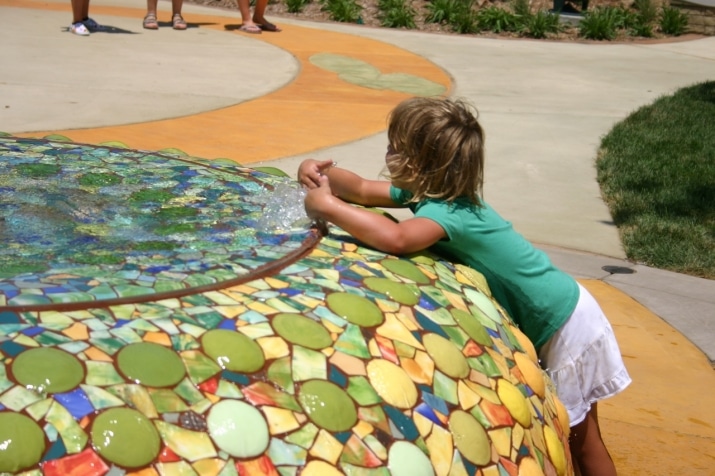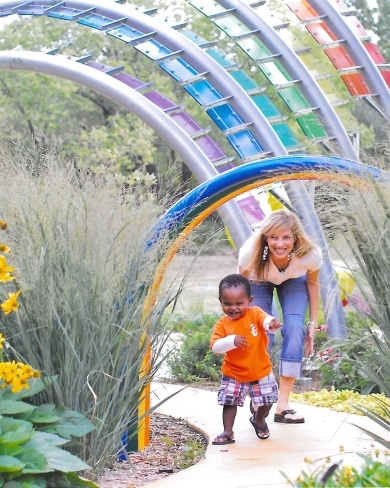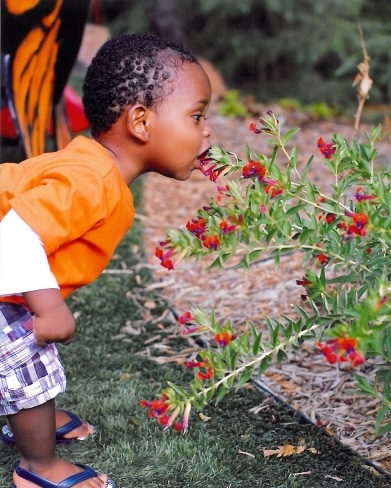Downing Children’s Garden
The primary purpose of the Downing Children’s Garden is to provide a beautiful, safe and playful place where children and families can grow together through shared experience, exploring nature and developing positive nurturing attitudes toward nature and the environment. The name “Garden” does not provide the complete picture as the Downing Children’s Garden encompasses over an acre of land with 12 different themed areas within. Each themed area provides a magical and unique experience from crawling up a 20 foot monster tree head, playing adventure in the tree house and swinging rope bridge, or dressing up in fairy or pirate clothes in the Enchanted Glenn where huge bugs habitat. The children’s amphitheater is the place to enjoy performers, storytellers and enjoy educational classes, and the Cargill Cares Farm invites people to do actual gardening, imagine role play in the farmhouse and play in the giant Party Barn. Children are exposed to plants and flowers indigenous to Kansas, but are also introduced to things they can only imagine like Peanut Butter and Jelly flowers, popcorn plants and bat face shrubs. Imagination and amusement thrive in the Downing Children’s Garden.
When creating and designing the Downing Children’s Garden, there was a primary focus of making each person’s visit special and important, and ultimately wanting to connect children to nature. It is proven that our children are at risk for losing touch with nature. Fewer children are enjoying the outdoors. Because of this, our children’s mental and physical health is in danger, and if we don’t create this important connection, the new generation will not be as healthy as previous generations nor will they have a passion for conserving our parks, refuges and wildlife. Children are born with a natural connection with nature and the Downing Children’s Garden is a place to nurture that connection and develop a healthier attitude toward nature, life and themselves.
The Downing Children’s Garden allows children to learn by active participation such as touching plants, smelling flowers, digging in dirt and running free. Children are encouraged to learn with hands-on activities, participatory lessons, demonstrations, and experiments. In addition to gardening, birding, looking for pests, and understanding the environment, the Garden is also an art gallery with works of art by local artists that complement the imaginative play aspect of the garden. Giant dragonflies fly above the natural pond, and caterpillars as big as a car, trees with faces and a sandy ant farm bigger than life create the dream like magical world that is the Downing Children’s Garden.
The Grand Opening was at the beginning of July of 2011, and despite the extreme summer heat , the Downing Children’s Garden welcomed thousands of children and their families each day. As expected our attendance has tripled and more specifically, our educational program has also increased with classes selling out quickly. The impact on the community and the children therein are huge, and the impact we see every day continues to surpass all the expectations we envisioned not only for the Children’s Garden but the overall garden at Botanica. In addition to thousands of the general public taking advantage of the new Downing Children’s Garden every day, we are partnering with the Title 1 Schools, Big Brothers Big Sisters, Boys and Girls Club, Communities in Schools, Wichita Children’s Home and The Opportunity Project (TOP) Early Learning Centers families to organize free days so that all children can experience the Downing Children’s Garden. The Downing Children’s Garden is a huge success, impacting thousands of children and their families, making our community a better place to live and raise a family.
Submitted by Botanica Wichita
(Click each photo to enlarge)
“I expect to pass through life but once. If therefore, there be any kindness I can show, or any good thing I can do to any fellow being,
let me do it now, and not defer or neglect it, as I shall not pass this way again.” ~William Penn



